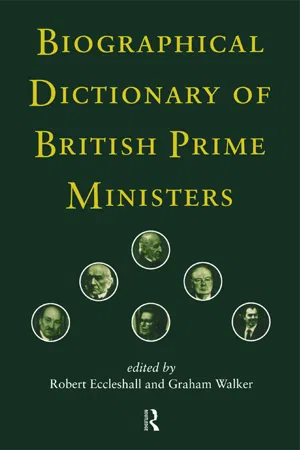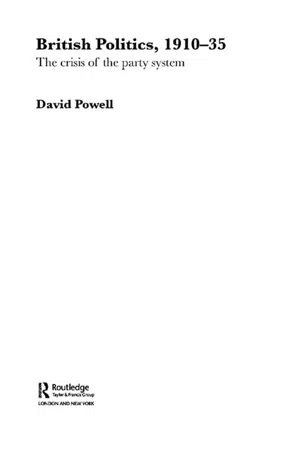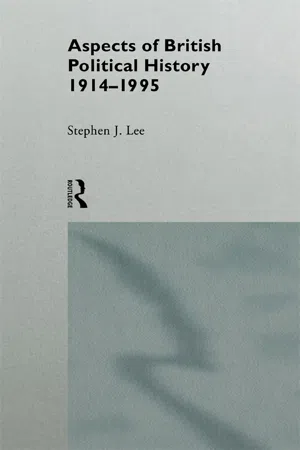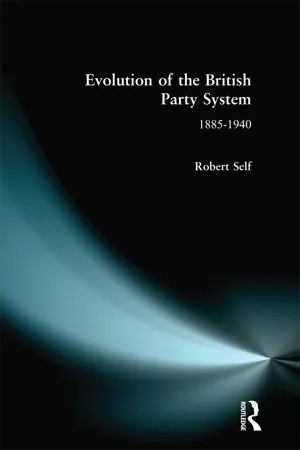History
David Lloyd George
David Lloyd George was a prominent British statesman who served as Prime Minister during World War I. He was known for his leadership in implementing social reforms and for his role in the Treaty of Versailles negotiations. Lloyd George's tenure saw significant changes in British politics, including the expansion of the welfare state and the extension of voting rights to women.
Written by Perlego with AI-assistance
Related key terms
8 Key excerpts on "David Lloyd George"
- eBook - ePub
- Robert Pearce, Graham Goodlad(Authors)
- 2013(Publication Date)
- Routledge(Publisher)
4 David Lloyd George (1863–1945) Prime Minister: December 1916– October 1922‘This siren, this goat-footed bard, this half-human visitor to our age from the hag-ridden, magic and enchanted woods of Celtic antiquity.’Maynard Keynes, The Economic Consequences of the Peace1Though he was born in 1863, so that his formative years were Victorian, and though for a time he seemed identified with narrow causes like temperance and Welsh disestablishment, David Lloyd George now seems a surprisingly modern political figure, in a way that his contemporaries do not. Partly this is due to the series of sexual and financial scandals that beset him, and which have so many recent counterparts that they seem somehow contemporary; partly, also, to his determination to alleviate poverty, an issue almost as important now – the poor, like the rich, being always with us – as in the first quarter of the twentieth century. Similarly, his political style seems distinctly modern. Here was no primus inter pares but a presidential leader, complete with a bevy of personal advisers: a man who liked to cut a dash on the national and international stages, always conscious of the need to influence the media. Belying his years, he was a person of great flexibility of mind. He adapted more successfully than any other British politician to the transition from peace to war in 1914, just as he was, in the 1920s, the first politician to espouse Keynesian economic policies. Though the office of premier had an aura of solemnity about it, Lloyd George often seemed a fresh and even playful figure, a rebel within the establishment. Even his irreverent jokes are still funny.2Yet if few doubt that Lloyd George was a man of enormous ability and energy, and could charm the birds from the trees, that is where consensus ends. To contemporaries he was a remarkably controversial figure, and he remains so to historians. What part did principle play in his career, what part opportunism? More specific questions must also be asked. Why did he become Prime Minister in December 1916? Was he motivated by patriotism, in that the war desperately needed a new energetic impulse, or did he indulge in unscrupulous intrigue against the honourable H.H. Asquith out of ambition? We also have to ask whether he was really, as his supporters insisted, ‘the man who won the war’, and what he achieved by carrying on a coalition into the equally momentous and challenging years of peace. - eBook - ePub
- Peter Pugh(Author)
- 2017(Publication Date)
- Icon Books Ltd(Publisher)
CHAPTER 5
David Lloyd George – A COUNTRY FIT FOR HEROES
D avid Lloyd George was perhaps the most unconventional of all British prime ministers in his background, character, outlook and policies. There was a highly adventurous, buccaneering quality about his six years in the premiership, between December 1916 and October 1922. Contemporaries were entranced, dazzled, astounded, impressed, alarmed and shocked by his behaviour and attitudes. One thing was certain: Lloyd George could never be ignored. He had emerged as a prominent and vociferous politician at the time of the Boer War in South Africa from 1899 to 1902 and continued to be respected or feared until the Second World War.Although he was born in Manchester, Lloyd George was brought up in rural Wales in humble circumstances and his Welsh background was vitally important in his life. He always spoke Welsh in his family circle and would even discuss high policy in Welsh on occasion, as with the deputy secretary of the Cabinet, Thomas Jones. Lloyd George was devoted to Wales and, while he rose to become a statesman of world stature, he never forgot his homeland and frequently returned there for relaxation. The deep influence of his early years in rural, Nonconformist Wales was revealed in his sometimes radical views, which were influenced by his dislike of landowners and inherited wealth; he did not fully comprehend urban radicalism and the more extreme manifestations of socialism. As a young man, he was ruthlessly determined to advance his career. His attitude is illustrated in one of his early letters to his future wife:My supreme idea is to get on. To this idea I shall sacrifice everything – except I trust honesty. I am prepared to thrust even love itself under the wheels of my Juggernaut, if it obstructs the way ... Believe me ... and may Heaven attest the truth of my statement – my love for you is sincere & strong. In this I never waver. But I must not forget that I have a purpose in life. And however painful the sacrifice I may have to make to attain this ambition I must not flinch – otherwise success will be remote indeed. David Lloyd George
National leadership in war and peace. A pioneer of social reform. 26 March 1945The death of Earl Lloyd George of Dwyfor, which is announced on another page, marks the loss of one of the most controversial and commanding figures in British political life. Though for many years he had been out of office, he left an indelible mark on his country’s history both as a protagonist of social reform and as an indomitable leader during the war of 1914–18.The Right Hon. David Lloyd George, pc, om , first Earl Lloyd George of Dwyfor, and Viscount Gwynedd, of Dwyfor in the county of Caernarvon, in the Peerage of the United Kingdom, was born in Hulme, Manchester, on January 17, 1863. His father, William, came of a stock of substantial farmers in South Wales, but, preferring books to the plough, left the farm and became a wandering missionary of education, teaching in many places, of which Manchester was the last. His mother was a Lloyd, daughter of a Baptist minister who lived at Llanystumdwy, near Criccieth, in Caernarvonshire. The father died when he was 42, leaving the mother to bring up David, then a baby of 18 months, a daughter, who was older, and another son, who was born posthumously. Hearing of her plight her brother, Richard Lloyd, at once left his workshop – he was a master bootmaker – and took his sister and her children back to live with him at Llanystumdwy. He treated his sister’s children as his own, and sent them to the village school. David at school is said to have been quick rather than industrious, and his best subjects were geography and mathematics.Start as a LawyerThe Georges had known Mr Goffey, a Liverpool solicitor, and in the family councils about the boy’s future it was finally decided, thanks mainly to his mother’s insistence, to make him a lawyer. At 16 he was articled to a firm of solicitors in Portmadoc. Five years later he had started as a solicitor on his own account at Criccieth, to which the family had by then removed, and his uncle’s back parlour was his first chambers. He began to get work, and in 1885 he and his younger brother William had offices in the main street of Portmadoc. Three years later – just after his twenty-fifth birthday – the young solicitor was doing well enough to marry Margaret Owen, who belonged to a prosperous yeoman family just outside Criccieth. The marriage was happy and helpful.- Robert Eccleshall, Graham Walker(Authors)
- 2002(Publication Date)
- Routledge(Publisher)
David Lloyd George, First Earl of Dwyfor
Born 17 January 1863, second child of William George and Elizabeth Lloyd. Educated at Llanystumdwy National School. Married (1) 1888 Margaret Owen (died 1941); (2) 1943 Frances Stevenson (died 1972). MP for Caernarfon Borough 1890–1945. President of the Board of Trade 1905–8; Chancellor of the Exchequer 1908–15; Minister of Munitions 1915–16; Secretary of State for War 1916; Prime Minister 1916–22. Left Commons and ennobled 1945. Died 26 March 1945.In both peace and war David Lloyd George was the central figure of British parliamentary life in the first quarter of the twentieth century. This achievement was the more remarkable in that he was a Welsh ‘outsider’ in a world dominated by the networked products of fee-paying English education. Although he had been born in Manchester, Lloyd George was brought up in rural north Wales, an environment which conditioned in him firm opposition to Anglicanism, land privileges and squirearchical control. His early political life took shape during the reawakening of Welsh national identity and cultural self-confidence in the last quarter of the nineteenth century; this was the backdrop to his by-election victory in Caernarfon Borough in 1890, a parliamentary seat he held for fifty-five years. In the Commons in the early years of his career his commitment was first to Welsh causes and second to the Liberal party. A reputation as a ‘maverick’, which was to accompany Lloyd George throughout his political life, was forged in these early days out of an ‘undisciplined’ backbench record and a high profile, and politically risky, opposition to the Boer War. Nevertheless, as the premier representative of an almost entirely Liberal Wales in 1906, he secured ministerial office. Thereafter his horizon widened well beyond distinctively Welsh causes, although his limited experience of urban and industrial conditions disadvantaged him in relation to matters of labour unrest and employer-worker conflict in the large industries such as coal-mining.- eBook - ePub
British Politics, 1910-1935
The Crisis of the Party System
- David Powell(Author)
- 2004(Publication Date)
- Routledge(Publisher)
Another difference between the new government and the old lay in the position of the prime minister himself. Whereas Asquith had been first and foremost a party leader, Lloyd George took office as an individual politician who had already placed himself to some extent beyond the trammels of conventional party politics. In due course, his lack of a secure party base was to prove a political weakness, but in the immediate circumstances of his accession to the premiership it was actually a strength. It meant that Lloyd George could pose as a genuinely national leader, above party, in much the same way that Winston Churchill was later to do in the summer of 1940. In this guise he was able to appeal for patriotic as well as personal loyalty, not just from those individual Conservatives with whom he was on good terms (or in whose eyes he was seen as the most effective available war leader) but from the Labour party too – as witnessed by his success in winning the support of Labour’s National Executive for his new administration in December 1916. The fact that he owed his position as prime minister to his personal standing rather than to party support also influenced the style of Lloyd George’s leadership. He was in any case a more dynamic, assertive personality than Asquith, but the nature of his situation encouraged what some commentators have seen as the ‘presidential’ traits in his character. While Bonar Law, as leader of the Coalition’s main bloc of supporters, was left with the more humdrum tasks of parliamentary management, Lloyd George concentrated on the executive conduct of the war, using his prime-ministerial authority to intervene personally in any and every aspect of government activity.Here too, in the substance of its policies as in the style of its leadership, the Lloyd George government seemed to represent a change from its predecessor. The new coalition took office at a critical stage in the war. On the military front the offensives of 1916 had failed. The Russians were coming under pressure that would take them out of the war in 1917; the Americans, though they entered the war as associates of the Allies in April 1917, could not bring effective military strength to bear until 1918 at the earliest. In the meantime there were real fears that the Allied positions on the Western and Italian fronts might deteriorate still further and that the German submarine campaign would bring Britain to its knees by cutting off vital supplies of food and war materials. Lloyd George, by his own account but also according to more impartial observers, played a key role in stabilising a dangerous and potentially catastrophic situation. The submarine challenge was tackled by the introduction of a convoy system for merchant shipping, which reduced sinkings, and by more effective organisation of the shipping industry. Faltering morale and mutterings in favour of a compromise peace were countered by the prime minister’s public confidence in total victory and the promulgation of more clearly defined war aims, coupled with improvements in the command and coordination of the Allied armies. Above all, the character of the new government as a government of national efficiency was underlined by a rapid reorganisation of the home front, including the establishment of new ministries in areas such as Shipping, Labour and Pensions, measures to extend state control and welfare provision and the introduction of food rationing to ensure the fair distribution of essential supplies. The inauguration of a Ministry of Reconstruction under Dr Christopher Addison in 1917 was an indication that the government was planning for the needs of peace as well as those of war, a precursor to the promise of a ‘fit land for heroes to live in’ that was to be heard in 1918. - eBook - ePub
- Stephen J. Lee(Author)
- 2005(Publication Date)
- Routledge(Publisher)
Chapter 2 ), in which Britain played a crucial military role: she increased her land-based commitment on the Western Front to equal that of France and did more than any other power to bring about the defeat of the Ottoman Empire in a war on the periphery. The surprising development of the war was that there were few major naval engagements, but British seapower ultimately proved crucial in the blockade against Germany in 1918. Overall, Britain played a more pivotal and varied military role in the First World War than in the Second. The impact of the war on Britain was considerable, expanding the scope of Government power and authority. There also occurred an upheaval in party politics resulting in the split in the Liberal party between Asquith and Lloyd George and the emergence of a coalition under the latter in 1916. The war provided Lloyd George with a launch into peacetime political ascendancy up to 1922, although ultimately he fell because of the lack of a party-political base. Chapter 2 also deals with the paradoxical impact of the war on each of the political parties, ultimately so different from what seemed most likely at the outset. It looks at the complex impact on the economy and society. In some ways the war acted as a radicalising force, while in others it accelerated, or reversed, pre-war trends. Such a traumatic experience was bound to have a wide range of contradictory results.Chapter 3 examines the fortunes of the Liberal party. One of the great institutions of the nineteenth century, this had evolved out of the Whigs during the 1860s. The Liberals had alternated in power with the Conservatives, then experienced a bleak twenty-year period after 1885 before winning a landslide in 1906. A major theme of the period 1914–39 was the Liberals’ decline as one of the two major political parties. Explanations for, and the implications of, this decline are considered. Was it already apparent before 1914? Was it the direct consequence of the First World War? And was it continuous—or were there periods of intermittent recovery?Figure 1 Prime Ministers 1908–95The counterpart to Liberal decline was the rise of the Labour party. This was relatively slow between 1900 and 1914, when it averaged 30 to 42 seats in Parliament. The First World War saw Labour make the necessary electoral breakthrough as a result of the 1918 Representation of the People Act and the decline of the Liberals. Labour was able to form its first government in 1924 because of a unique set of circumstances, dealt with in Chapter 4 - eBook - ePub
- Alan Sykes(Author)
- 2014(Publication Date)
- Routledge(Publisher)
CHAPTER EIGHT Lloyd George and Coalitionism The triumph of Lloyd George was not followed by the triumph of British arms. There was some success in the Middle East, but this could not offset retreat in the Balkans, the defeat of Italy and above all the failure of the summer offensive on the western front where the third battle of Ypres, better known as Passchendaele, was another unsuccessful bloodbath. Russia’s withdrawal from the war following internal collapse and revolution would be more than compensated by America’s entry in April 1917, but apart from the availability of American credits to ease an increasingly desperate financial situation, the full advantages of American participation would not be felt for some time. In the meantime, Germany was free to reinforce the western front. At home, the pressures of war drove the government into ever more rigorous intervention. In the face of shortages of all kinds, even essential industries were combed for men, the mines, railways, shipping and food production came under government control, rents and prices were regulated and rationing introduced for all essential supplies. Below the small war cabinet, the government functioned as a complex of regulatory offices, new ministries staffed by a-political businessmen reflecting, as the creation of the ministry of munitions had done, the priorities of the war rather than any ideological impulse to collectivism. 1 Apart from the politically sensitive ministry of labour which remained in the hands of political Labour, ‘businessmen of push and go’ were recruited to both old and new ministries - eBook - ePub
- Robert C. Self(Author)
- 2014(Publication Date)
- Routledge(Publisher)
Chapter seven The Lloyd George Coalition, 1918-19227.1 The impact of LabourIn retrospect, it is tempting to regard the postwar Coalition as an anachronistic vestige left over from the war, before the resumption of a 'normal' pattern of party conflict in 1922. Yet in reality, the Coalition represented a premeditated effort permanently to reconstruct anti-socialist party politics to address the twin challenges of Labour and mass democracy. The boldness of this ambition and the urgency with which it was pursued are explicable only in terms of the political disorientation left by a war which had swept away most of the great party controversies that had imparted meaning to Edwardian electoral allegiance. In this strange new political world, Liberal and Conservative leaders echoed Lord Hugh Cecil's lament that 'our old landmarks are submerged and it is not easy to find a resting place for the soles of one's feet'. The challenge confronting politicians after the war was the need to erect fresh landmarks to guide a new mass electorate they feared less because it was unpredictable than because it was potentially more capricious, ignorant and gullible to irresponsible Labour promises. 'What shall we inscribe on our standard?' Austen Chamberlain asked his half-brother in 1917. 'How and for what seek to rally Unionist and conservative ... forces after the war for the problems which then confront us?' In particular, his mind settled on a future 'full of difficulty and dangers, strikes, discontents and much revolutionary feeling'. Above all, there was the need to combat 'what its exponents called a "class consciousness", but what [he] should call a class prejudice, which is something new in our political life'.1 More recent historians have labelled this challenge 'the impact of Labour'.2Immediately after the war, it was the industrial threat from the Labour movement which most preoccupied its opponents. In the wake of the February 1917 revolution in Russia, an upsurge of rank-and-file militancy saw the number of days lost in disputes rise sharply from 2,450,000 in 1916 to 5,650,000 in 1917. In June, at the Leeds Convention organised by the antiwar ILP and BSP, some 1,150 delegates had even briefly conjured up the spectre of Workers' and Soldiers' Councils on Russian lines. Although even the most radical trade union leaders had urged patriotic restraint in face of Ludendorff's offensive in the spring of 1918, after it collapsed in late July it was clear that industrial militancy could not be held in check for long and with the return to peace the nation witnessed a massive upsurge of actual and threatened industrial action to maintain the gains of the war years and restore prewar union prerogatives. During 1919 there was strife in mining, engineering, shipbuilding, the railways, London Underground and even a police strike in London and Liverpool. In total, 1,352 stoppages cost 34,970,000 working days in 1919. During the first half of 1920, economic boom, inflationary pay rises and more skilful ministerial leadership substantially improved the state of labour relations. As the economy collapsed into an intense slump during 1921, however, the latitude for concession and manoeuvre on all sides was removed. The outcome was an unprecedented total of 85,870,000 days lost to strikes in 1921 — a figure more than double its prewar peak in 1912.3
Learn about this page
Index pages curate the most relevant extracts from our library of academic textbooks. They’ve been created using an in-house natural language model (NLM), each adding context and meaning to key research topics.







